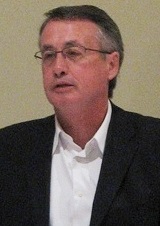 |
| Australian Federal Treasurer, Wayne Swan (ALP, Lilley) |
My position on this issue hasn't changed since 2010. The Republican movement has yet to put forward a strongly compelling argument demonstrating why Australia should no longer be a constitutional monarchy and become a republic. Australia has been offered two possible republic models. Under one, the President would be chosen by a two thirds majority of Parliament. The alternative would be a popular election. One good thing about not having a popularly elected head of state is that Australia does not have to endure American style election campaigns. Arguably the election winner isn't always the best candidate, but the best campaigner and fundraiser. Raising campaign funds means going behind the scenes to grant special favours to campaign backers in in exchange for financial support. Corruption in Australian campaign finance is enough of a problem as it is.
From memory it was almost two years between Barack Obama announcing his presidential candidacy until the 2008 US presidential election. Were it to have a President chosen by popular vote, my reading of the Australian electorate is that it wouldn't have the patience for such a drawn out campaign between rival candidates.
Whether the President was chosen by Parliament or by popular vote, another drawback is the potential for activist groups such as GetUp to attempt to influence the selection process. Australia's Governor-General is largely a ceremonial figure. Although they have often used their position to highlight social issues, they absent themselves from political debate. Since it is unclear if a President would follow this convention, especially a popularly elected one, this potentially creates unforseen constitutional implications.
Retaining Australia's present constitutional arrangements spares Australia the potential of exacerbating corruption in the political process, American style election campaigns, and the possibility of upsetting the balance of powers between the legislative, executive, and judicial branches of government by having a President seeking to intervene in the political process. Change is all very well, but it has to be change for the better rather than change for the sake of if. Our present constitutional arrangements work satisfactorily, so why alter them?
http://www.norepublic.com.au/
http://www.ouridentity.org.au/
No comments:
Post a Comment